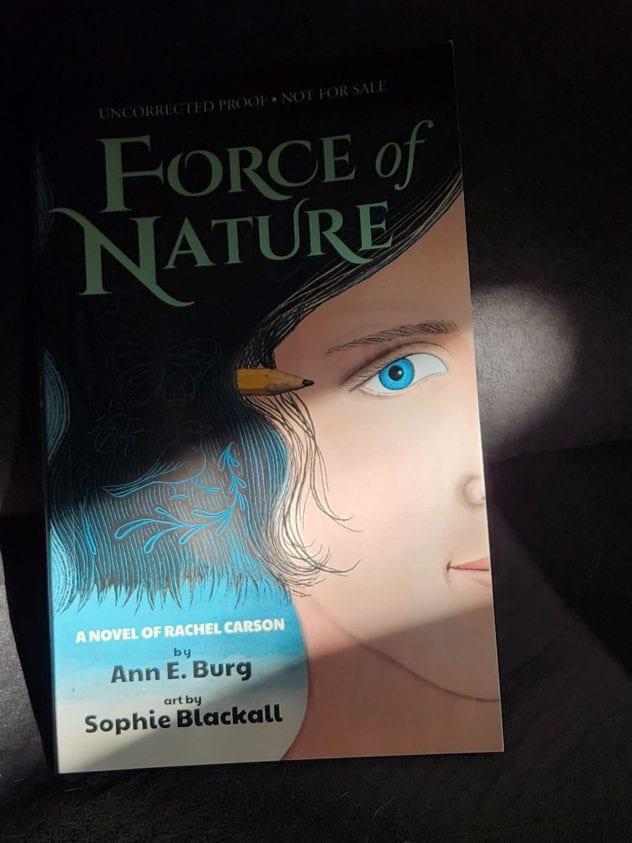Today is Poetry Friday and Jone Rush MacCulloch is hosting today with her winter solstice adventures. My younger daughter was born on the winter solstice, a bit of added sunshine for this early darkening day. I just got back from a trip to visit my elder daughter and came home to a delightful winter poetry swap from Robyn Hood Black. I want to revel in the exquisiteness of it for a few days and share next week. In the meantime, here’s what I’ve been reading:

Force of Nature, by Ann E. Burg, is a verse novel of Rachel Carson. It is a delightful celebration of the love Rachel had for Earth and her all too short life here. In her extensive research, Ann found a voice for Carson as a child and young person with dreams of being first a writer and then a scientist, until finally finding her place as both–“Why did it never occur to anyone that my pen and my microscope could find new purpose together?” Rachel asks in the novel when she has success as a science writer.
The life of Rachel Carson as told through Burg’s eyes and wisdom, immediately led me to borrow Silent Spring from my library and read it. I had heard of and read of Rachel Carson before, but I had yet to read her work. Even though it is sixty years since publication, I was enthralled to read her world-changing writing. The poisoning of the environment with chemical insecticides like DDT was the major theme. With much research and many examples, she made the case, and the world heard. She ends the book with reasons for hope as she described alternative methods to reduce insects that cause disease and crop devastation.
Carson writes in her own poetic style; for instance, in the first half of chapter 15 she artfully describes the inter-connected community of insect species: “Or there, almost invisible against a leaf, is the lacewing, with green gauze wings and golden eyes, shy and secretive, descendent of an ancient race…” After reading Rachel Carson, it makes me appreciate even more Burg’s verse novel genre for Force of Nature.
Rachel was born in 1907, therefore her educational and career opportunities were limited. Burg describes well how she surmounted obstacles to become a successful author and scientist, especially sexism. One small (huge) thing in Silent Spring that I noticed (bothered me) was the use of the word men. Not just the word “men” in place of “humanity” or “people,” but also in speaking of people who did the work of the world: control men, federal field men, understanding men, spraying men, research men, medical men, practical men of industry, working with chemicals men, even though many times she was part of the people she called men (e.g., research person, understanding person). Of course, we all know the era she found herself in was even more dominated by men than it is today!
I was curious about how things have changed since Silent Spring, so I continued digging and reading. Some chemical pesticides were banned for use on agriculture because of Carson’s work, and the bald eagle was saved as a result. However, the use of pesticides in the U.S. has continued to grow–we use more than 500% of what was used in 1960*.
Here are some of the many interesting articles that come up in a simple Google search:
- *A World Drenched with Pesticides: Rachel Carson’s Silent Spring
- How Rachel Carson’s ‘Silent Spring’ Awakened the World to Environmental Peril
- Fifty Years after Silent Spring, Assault on Science Continues
- Silent Spring: 60 Years Later
- ‘Silent Spring’ 60 years on: 4 essential reads on pesticides and the environment
Ann Burg’s new novel, Force of Nature, comes out in spring of 2024. I am hopeful it will inspire many young people (and old) to dig deeper into Rachel Carson’s legacy and find for themselves a greater love and concern for our Earth. I have.
we are keepers of Earth, but too cowardly to
move the goal to sustainability. We’ve wreaked havoc
from Antarctica to Iceland, in a
crisis of melting. From U.S.
to China to India in a
crisis of poisoning.
Merely for more money, we are
trading Eden for Hades, and
one Earth is not large enough. A
problem for us, but more
for those coming after–there won’t be
another Earth. Let’s repair this one.
Striking line: “We move from crisis to crisis, merely trading one problem for another” from Silent Spring.